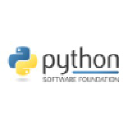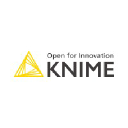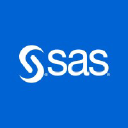The 12 Best Data Mining Tools in 2024
1. Python
- Intuitive and user-friendly interface
- Support for multiple operating systems: Windows, macOS, Linux, and more
- Efficient monitoring and management of databases, web servers, and network flows

The Python development tool offers an intuitive and user-friendly interface, making it easy to monitor and manage various aspects of IT infrastructure. With support for multiple operating systems, efficient monitoring of databases, web servers, and network flows, it is a versatile and powerful tool for Python developers.
2. R
- Utilizes advanced AI technology for enhanced productivity
- Offers seamless integration with various business processes
- Provides intuitive user interface for easy navigation and usage

R is a cutting-edge AI application designed to revolutionize business operations, offering advanced features and seamless integration to enhance productivity and decision-making processes.
With its intuitive interface and powerful capabilities, R is a valuable asset for businesses striving for efficiency and success in today's competitive landscape.
3. RapidMiner
- Robust pricing optimization software
- Utilizes science of pricing, AI, and machine learning
- Automated documentation for full transparency
- Integration with existing business processes and tools

RapidMiner offers robust pricing optimization software with a scientific pricing strategy, AI, and machine learning capabilities, seamlessly integrated with existing business processes and tools.
Businesses can benefit from dynamic pricing, automated documentation, and transparency, ensuring optimal pricing solutions for their products and services.
4. Orange
- Efficient virtualization of multiple operating systems on a single machine
- Allocation of resources for improved machine efficiency
- Support for a wide range of languages and deployment options

Orange Virtualization Software provides efficient virtualization capabilities, supporting multiple operating systems on a single machine while offering a wide range of deployment options. With competitive pricing and a strong user satisfaction track record, Orange is a reliable choice for businesses seeking powerful virtualization solutions.
With a focus on user-friendly interfaces and robust performance, Orange Virtualization Software stands out as a versatile and reliable tool in the virtualization market.
5. Rattle GUI
- User-friendly graphical user interface for data mining using R
- Provides statistical and visual summaries of data
- Transforms data for easy modeling and presents model performance graphically

Rattle GUI is an open source software offering a user-friendly graphical interface for efficient data mining using R. It provides statistical and visual summaries of data, transforms data for easy modeling, and presents model performance graphically.
6. KNIME
- User-friendly interface for creating data analysis workflows
- Open-source platform with a wide range of integrations and extensions
- Advanced capabilities for data processing, visualization, and machine learning

KNIME is an open-source application that offers an intuitive interface, advanced data processing capabilities, and extensive support for machine learning and visualizations, making it a powerful choice for businesses and independent data professionals.
With cross-industry applicability and a strong emphasis on security and user support, KNIME is a versatile tool for optimizing data-driven decision-making processes.
7. SAS Enterprise Miner
- Scalable platform suitable for both large and small businesses
- Powerful data preparation and exploratory analysis features
- Secure cloud integration for data storage and management

Discover the unparalleled capabilities of SAS Enterprise Miner, a scalable and powerful platform designed for advanced data mining and exploratory analysis.
With its secure cloud integration and robust features, SAS Enterprise Miner is the ideal solution for businesses looking to leverage big data for informed decision-making.
8. Oracle Data Miner
- Interactive workflow tool for creating, evaluating, modifying, sharing, and deploying machine learning methodologies
- Supports various data types, including structured, unstructured, transactional, and spatial and graph data
- Integrates with open source R for data-parallel and task-parallel execution

Oracle Data Miner is a powerful data mining and machine learning platform that offers an intuitive user interface and comprehensive features for modeling and deploying machine learning methodologies. With support for various data types and seamless integration with open source R, Oracle Data Miner is a versatile and efficient solution for businesses looking to harness the power of their data.
9. IBM SPSS Modeler
- Advanced statistical analysis capabilities
- Seamless integration with big data
- Easy-to-use interface for coders and non-coders alike

IBM SPSS Modeler is a powerful software offering advanced statistical analysis, seamless integration with big data, and a user-friendly interface suitable for users of all skill levels. With flexible pricing options, it's the ideal choice for businesses looking to derive valuable insights from their data.
Discover the benefits of IBM SPSS Modeler and take your data analysis to the next level!
10. TIBCO Data Science
- Detailed documentation available
- TIBCO Spotfire visual and analytic tool
- Multiple data source access

TIBCO Data Science offers detailed documentation and a TIBCO Spotfire visual and analytic tool, making it a reliable solution for organizations requiring ML algorithms. However, businesses may encounter challenges with the installation process and higher software costs.
With TIBCO Data Science, businesses can create unique solutions using ML and open-source development tools. The software supports both no-code and coding algorithms, enabling data scientists and laypersons to create ML pipelines with ease.
11. Apache Mahout
- Open source framework for distributed data mining
- Extensive collection of libraries and algorithms for data processing, analysis, and optimization
- Modular native solvers enable CPU/GPU/CUDA acceleration for machine learning

Apache Mahout is an open-source framework that offers distributed data mining capabilities, an extensive library of algorithms, and modular native solvers for machine learning tasks. With its focus on scalability and efficiency, Apache Mahout is a valuable tool for handling large datasets and accelerating data processing and analysis.
12. DataMelt
- Robust mathematical and scientific libraries for statistical analysis and data visualization
- Open-source and fully-customizable
- Integration with R for user-defined functions
DataMelt is a free, open-source data mining and analytics tool with robust mathematical and scientific libraries for statistical analysis and data visualization. Its integration with R for user-defined functions and extensive support resources make it an ideal choice for data professionals and scientists.
13. MonkeyLearn
- Efficient text mining and natural language processing capabilities
- Cloud-based platform for easy accessibility and scalability
- Advanced sentiment analysis and data visualization

MonkeyLearn is a leading text mining and natural language processing platform that offers advanced capabilities for businesses to gain valuable insights from textual data. With its cloud-based accessibility and advanced features, MonkeyLearn is the go-to tool for efficient text mining and sentiment analysis.
Discover why businesses are turning to MonkeyLearn for their text mining needs, and unlock the power of textual data to drive informed decision-making and operational success.
FAQ
What are the key features to look for in data mining tools?
When considering data mining tools, it's important to prioritize scalability and efficiency. Look for tools that offer predictive modeling capabilities, ease of integration with existing systems, and strong visualization and reporting features.
How can data mining tools help businesses improve decision-making?
Data mining tools provide insights into patterns and trends within large datasets, enabling businesses to make data-driven decisions. By leveraging these tools, organizations can optimize operations, identify new opportunities, and enhance customer experiences.
What role do data mining tools play in advanced analytics?
Data mining tools are crucial for conducting advanced analytics such as predictive modeling, segmentation, and pattern recognition. These tools enable businesses to uncover actionable insights from complex datasets and drive strategic decision-making.
How do data mining tools contribute to data quality management?
Data mining tools can assist in data cleansing, deduplication, and anomaly detection, thereby improving data quality within an organization. By leveraging these tools, businesses can ensure that their data assets are accurate and reliable.
What are the considerations for selecting the right data mining tool for a specific business?
When choosing a data mining tool, it's important to evaluate compatibility with existing data infrastructure, ease of use for the organization's analytics team, as well as the specific use cases that the tool is designed to address.

FAQ
Data mining tools provide insights into patterns and trends within large datasets, enabling businesses to make data-driven decisions. By leveraging these tools, organizations can optimize operations, identify new opportunities, and enhance customer experiences.
Data mining tools can assist in data cleansing, deduplication, and anomaly detection, thereby improving data quality within an organization. By leveraging these tools, businesses can ensure that their data assets are accurate and reliable.
When choosing a data mining tool, it's important to evaluate compatibility with existing data infrastructure, ease of use for the organization's analytics team, as well as the specific use cases that the tool is designed to address.